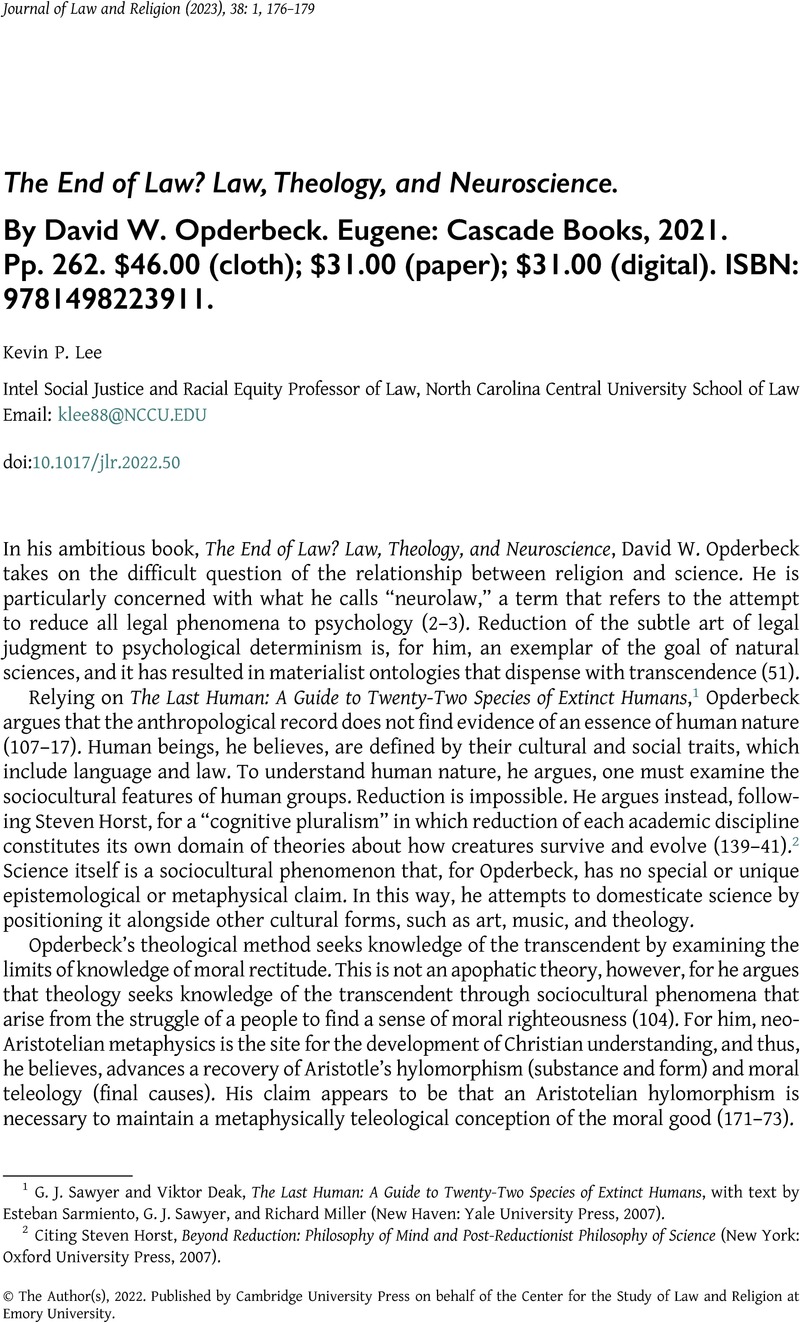No CrossRef data available.
Published online by Cambridge University Press: 07 December 2022

1 G. J. Sawyer and Viktor Deak, The Last Human: A Guide to Twenty-Two Species of Extinct Humans, with text by Esteban Sarmiento, G. J. Sawyer, and Richard Miller (New Haven: Yale University Press, 2007).
2 Citing Steven Horst, Beyond Reduction: Philosophy of Mind and Post-Reductionist Philosophy of Science (New York: Oxford University Press, 2007).
3 Ludwig Wittgenstein, review of The Science of Logic: An Inquiry into the Principles of Accurate Thought and Scientific Method, by P. Coffey, Cambridge Review 34, no. 853 (1913): 351.
4 Luciano Floridi, The Philosophy of Information (Oxford: Oxford University Press, 2011).
5 Carlo Rovelli, The Order of Time, trans. Erica Segre and Simon Carnell (New York: Riverhead Books, 2018).
6 H. L. A. Hart, The Concept of Law, 3rd. ed. (Oxford: Oxford University Press, 2012). For a discussion of Wittgenstein’s influence on Hart, see Anthony J. Sebok, “Finding Wittgenstein at the Core of the Rule of Recognition,” Southern Methodist University Law Review 52, no. 1 (1999): 75–110.
7 Rudolf Carnap, The Logical Structure of the World, and Pseudoproblems in Philosophy, trans. Rolf A. George (Chicago: Open Court Press, 2003).
8 W. V. Quine, “Epistemology Naturalized,” in Ontological Relativity and Other Essays (New York: Columbia University Press, 1969), 69–90.
9 Hilary Putnam, “The Collapse of the Fact/Value Dichotomy,” in The Collapse of the Fact/Value Dichotomy, and Other Essays (Cambridge, MA: Harvard University Press, 2003), 1–63.
10 Brian Leiter, “Rethinking Legal Realism: Toward a Naturalized Jurisprudence,” in Naturalizing Jurisprudence: Essays on American Legal Realism and Naturalism in Legal Philosophy (Oxford: Oxford University Press, 2007), 15–58.
11 Brian Z. Tamanaha, A Realistic Socio-legal Theory: Pragmatism and a Social Theory of Law (Oxford: Oxford University Press, 1999).
12 Charles Sanders Pierce, “Pragmatism as a Principle and Method of Right Thinking,” in Pragmatism as a Principle and Method of Right Thinking: The 1903 Harvard Lectures on Pragmatism, ed. Patricia Ann Turrisi (Albany: State University of New York Press, 1997), 107–256.
13 Richard Rorty, Philosophy and the Mirror of Nature (Princeton: Princeton University Press, 1979).
14 Richard A. Posner, Law, Pragmatism, and Democracy (Cambridge, MA: Harvard University Press, 2003).
15 For a discussion of Derrida’s influence on legal thought, see Jack M. Balkin, “Deconstruction’s Legal Career,” Cardozo Law Review 27, no 2 (2005): 719–40.
16 Willemien Otten, Thinking Nature and the Nature of Thinking: From Eriugena to Emerson (Stanford: Stanford University Press, 2020); David Bentley Hart, You Are Gods: On Nature and Supernature (Notre Dame: University of Notre Dame Press, 2022); John Milbank, Theology and Social Theory: Beyond Secular Reason (Oxford: Blackwell, 1990).